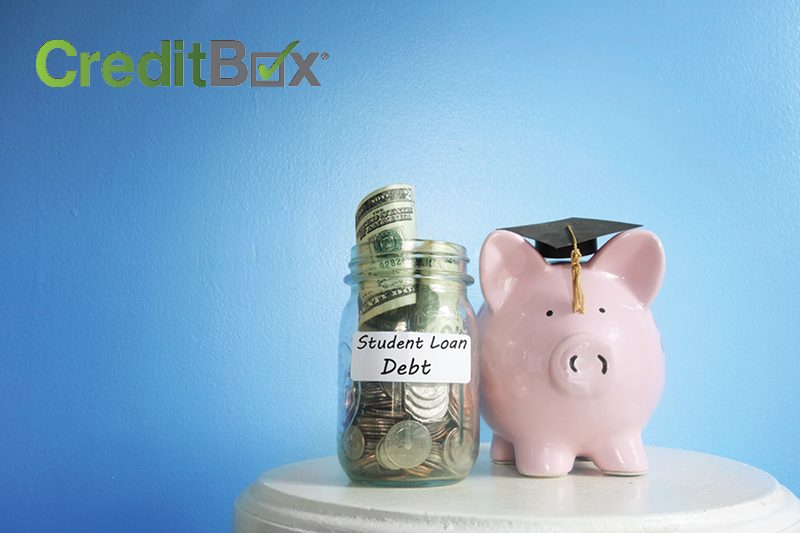
Do You Have Student Loan Debt?
Blog icon
Congratulations on your graduation! Ready or not, it's time to start repaying your student loans. If you're not sure where to start, read on to learn your options and how to handle repayment during financial hardship.
Evaluate Repayment Options
After graduation or leaving college, you might have a grace period of a few months before you start paying back your student loans. Use this time to evaluate repayment options. You'll automatically enroll in a standard repayment plan designed to help you pay down the loans quickly. However, this might not be the best option for you if you're still struggling to get a footing with your finances.
A graduated repayment plan starts off with smaller payments and then increases their amounts over time. Extended repayment plans give you up to 25 years to pay off your loans, notes U.S. News. This often means you'll pay more in interest. Income-based repayment plans base your monthly payments on the amount of money you make, so they're more affordable.
Consolidate Your Student Loans
Many graduates acquire multiple student loans during their time at school. This means that you have multiple payments to make each month. Consolidation puts all of the loans together so that you only need to make one payment. This makes it easier to keep track of, and simplifies your budgeting.
Know Your Options During Financial Hardships
Some people struggle to secure employment in their chosen fields after graduation. Others might get laid off before they've finished paying off their loans. There are dozens of reasons you might go through a period of financial hardship. You're still on the hook for your student loans, so you might be wondering how to make the payments without defaulting. You can apply for deferment or forbearance. You're also permitted to pause payments for a short period until you get back on your feet.
Look for Student Loan Forgiveness
Certain professions offer student loan forgiveness or cancellation, meaning you don't have to repay the debt you've accrued. For example, in some locations, teachers and public servants can have their debts canceled after working a certain number of years on the job. Additionally, some organizations or companies offer this option to entice workers to move to areas where there's high demand for employees.
Manage Your Other Debts Wisely
Many graduates spend a decade or more making payments on their student loans. It's important not to take on any other large debts (such as a mortgage or car payment) during this time unless you can definitely afford them. Many students also graduate with a fair amount of credit card debt in addition to their student loans. Make sure you have a plan for handling all of your debts to avoid paying more money in interest than you need to.
There are systems in place to help you manage student loans during financial hardship. If you need a loan to cover unexpected bills or everyday expenses during this time, call on CreditBox. Apply online for loans up to $4,000 today!
References:
https://money.usnews.com/money/blogs/my-money/2014/01/17/4-ways-to-avoid-being-crushed-by-student-loan-debt
Evaluate Repayment Options
After graduation or leaving college, you might have a grace period of a few months before you start paying back your student loans. Use this time to evaluate repayment options. You'll automatically enroll in a standard repayment plan designed to help you pay down the loans quickly. However, this might not be the best option for you if you're still struggling to get a footing with your finances.
A graduated repayment plan starts off with smaller payments and then increases their amounts over time. Extended repayment plans give you up to 25 years to pay off your loans, notes U.S. News. This often means you'll pay more in interest. Income-based repayment plans base your monthly payments on the amount of money you make, so they're more affordable.
Consolidate Your Student Loans
Many graduates acquire multiple student loans during their time at school. This means that you have multiple payments to make each month. Consolidation puts all of the loans together so that you only need to make one payment. This makes it easier to keep track of, and simplifies your budgeting.
Know Your Options During Financial Hardships
Some people struggle to secure employment in their chosen fields after graduation. Others might get laid off before they've finished paying off their loans. There are dozens of reasons you might go through a period of financial hardship. You're still on the hook for your student loans, so you might be wondering how to make the payments without defaulting. You can apply for deferment or forbearance. You're also permitted to pause payments for a short period until you get back on your feet.
Look for Student Loan Forgiveness
Certain professions offer student loan forgiveness or cancellation, meaning you don't have to repay the debt you've accrued. For example, in some locations, teachers and public servants can have their debts canceled after working a certain number of years on the job. Additionally, some organizations or companies offer this option to entice workers to move to areas where there's high demand for employees.
Manage Your Other Debts Wisely
Many graduates spend a decade or more making payments on their student loans. It's important not to take on any other large debts (such as a mortgage or car payment) during this time unless you can definitely afford them. Many students also graduate with a fair amount of credit card debt in addition to their student loans. Make sure you have a plan for handling all of your debts to avoid paying more money in interest than you need to.
There are systems in place to help you manage student loans during financial hardship. If you need a loan to cover unexpected bills or everyday expenses during this time, call on CreditBox. Apply online for loans up to $4,000 today!
References:
https://money.usnews.com/money/blogs/my-money/2014/01/17/4-ways-to-avoid-being-crushed-by-student-loan-debt
